The secrets of 13 stunning abandoned mansions
Magnificent mansions worth rescuing
![<p>Mike Bonitz / Flickr [CC BY-ND 2.0 DEED]</p>](https://s.yimg.com/ny/api/res/1.2/YtIwLLHOcljsOj1bMla60w--/YXBwaWQ9aGlnaGxhbmRlcjt3PTk2MDtoPTYxOQ--/https://media.zenfs.com/en/loveproperty_uk_165/fabdf7422c93c9390638f0134b7a93ab)
Mike Bonitz / Flickr [CC BY-ND 2.0 DEED]
Once among the most revered residences of their day, these extraordinary photographs reveal the sorry state of some of the world's forgotten mansions. Abandoned and left to languish, their grand hallways stand eerily silent, with Mother Nature fast reclaiming their exquisite architecture.
Read on to take a tour of these time-worn treasures and uncover the fascinating tales hidden within their walls...
Mellon mansion, Florida, USA
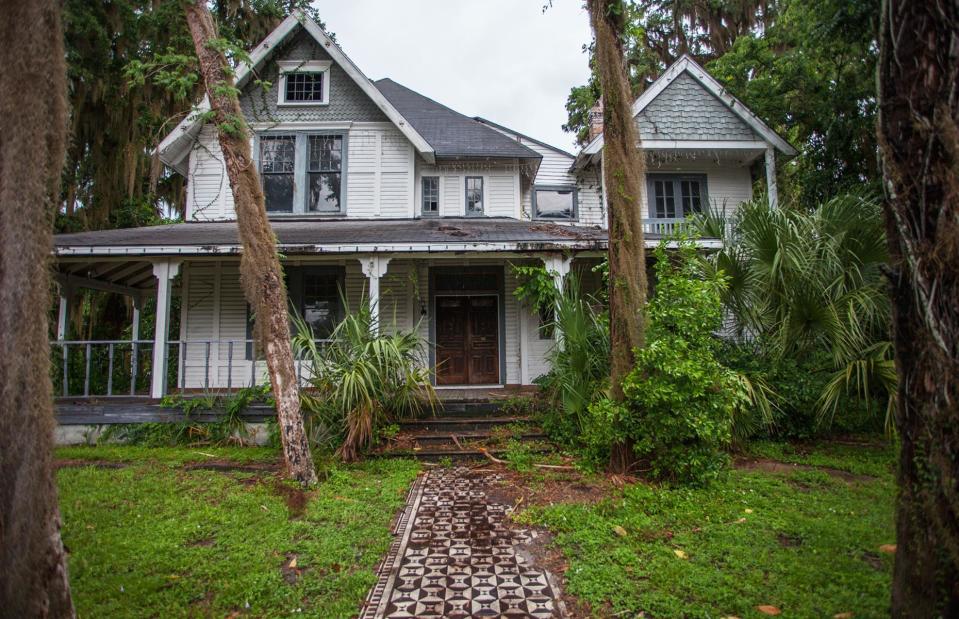
Abandoned Southeast
Nestled in the overgrowth in Palatka, Florida, this clapboard home was once the summer residence of James Ross Mellon, a finance tycoon and part of one of America's richest dynasties of the 19th and 20th centuries. Mellon's father, Irish immigrant Thomas Mellon, left his substantial banking and real estate fortune to his sons following his death in 1908.
While James and his wife Rachel lived in Pennsylvania, they would retreat to Florida's tropical climes in the winter months and eventually built this 6,000-square-foot property as their Sunshine State base.
Mellon mansion, Florida, USA
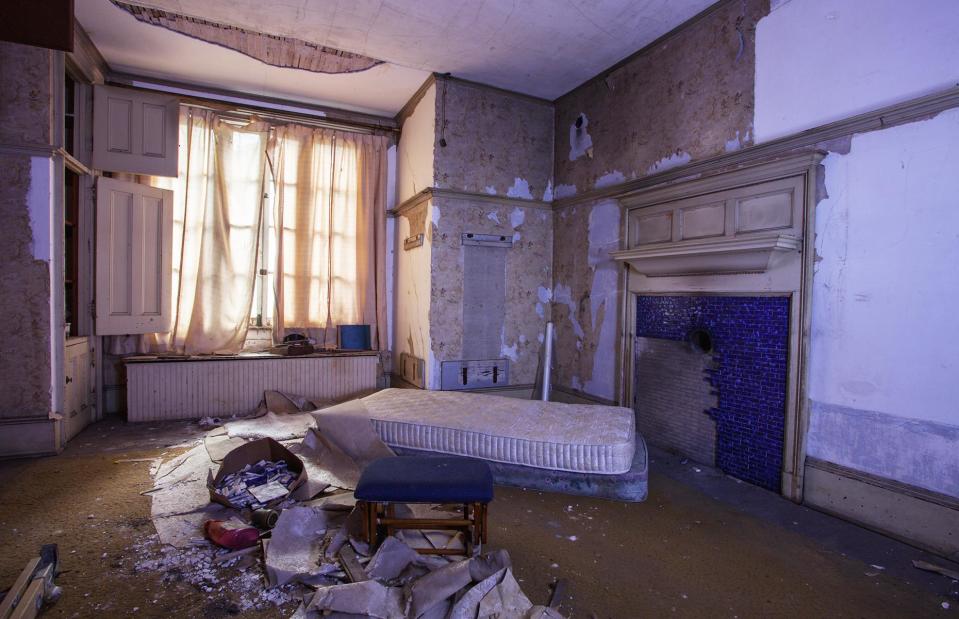
Abandoned Southeast
Photographer Leland Kent of Abandoned Southeast captured the home in a sorry state of abandonment back in 2019.
In this faded parlour, glimmers of the space's former grandeur are eclipsed by its decaying state. Peeling plasterwork and debris litter the floor, leaving parts of the structural framework exposed.
But if you look carefully, a number of period treasures have weathered the years of neglect. Framed by wood panelling, what was once the hearth still features a beautiful surround of inky blue metro tiles.
Mellon mansion, Florida, USA
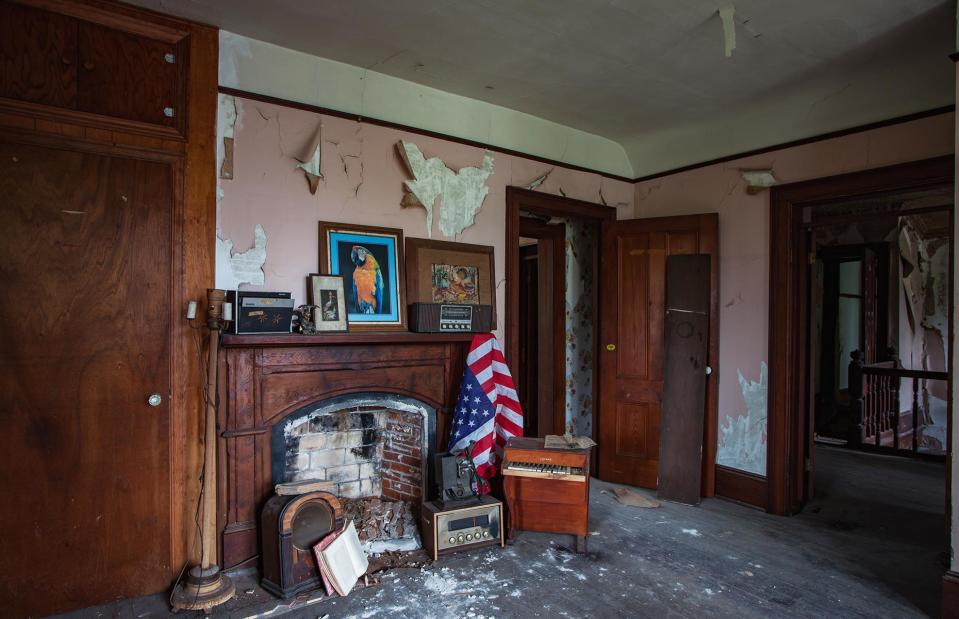
Abandoned Southeast
Rachel passed away in 1919, but James reportedly continued to visit the Palatka property until his death in 1934. The house passed through a handful of owners in the years that followed but doesn't appear to have been lived in for decades. In fact, a dog-eared calendar left behind in the house was dated January 1970.
Mementos from a succession of occupants offer a window into the lives that once called this forlorn residence home. Framed artwork is displayed on the hearth, alongside antique radios and a miniature children's piano. Elsewhere, Kent discovered an ornate grand piano in the drawing room, signalling the musical inclinations of a past resident.
Mellon mansion, Florida, USA
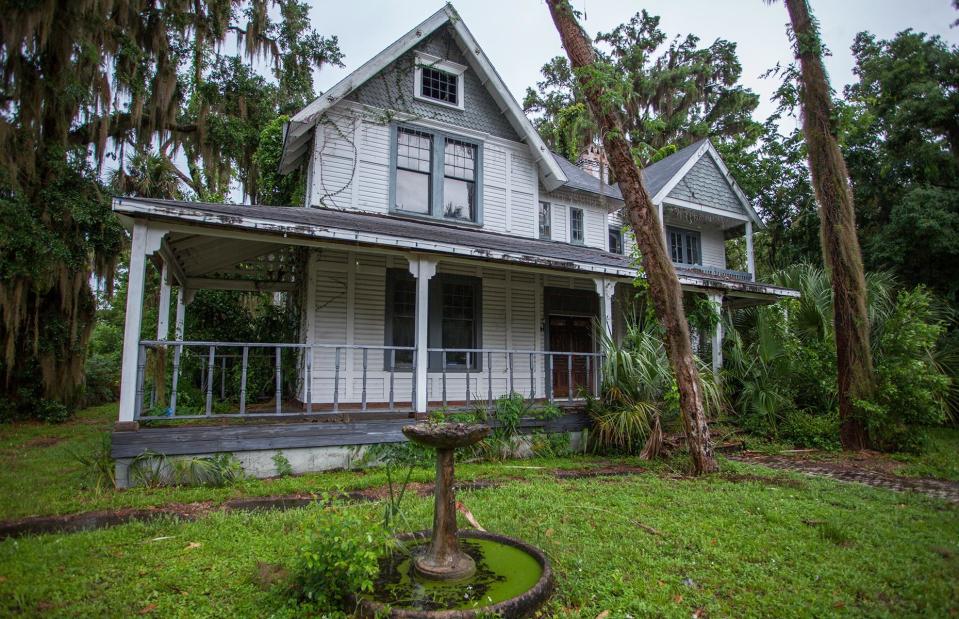
Abandoned Southeast
According to Forbes, the Mellon dynasty is still worth around $14.1 billion (£11.1bn) at the time of writing, continuing its claim as one of America's richest families.
Despite the home's affluent roots, the Mellon mansion continues to languish, its deterioration no doubt exacerbated by Florida's humid climate. Its beautiful architecture and enchanting antiques speak to a rich and colourful past, yet the future looks bleak for this forgotten family home.
Appuldurcombe House, Isle of Wight, UK
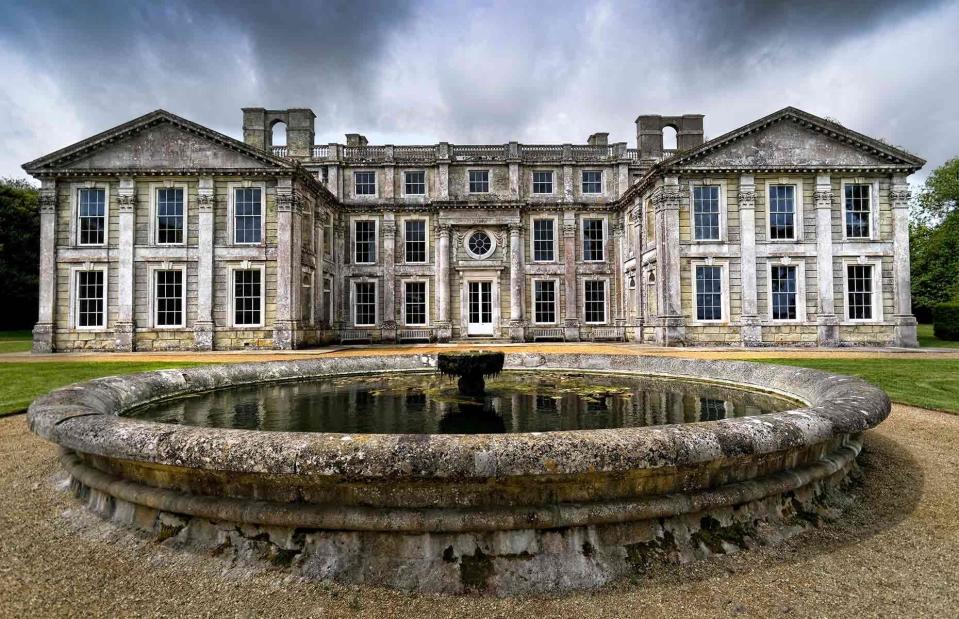
Philip Chapman / Alamy Stock Photo
Located on the Isle of Wight, just off the south coast of England, this palatial property has rather more humble roots than its stone façade might suggest. According to records from Historic England, the site was first occupied by a monastery as early as 1100, before an Elizabethan manor took its place in the 16th century.
The regal structure we see today was built in the early 18th century by Sir Robert Worsley, 4th Baronet, an English politician and head of one of the Isle of Wight's most influential dynasties of the era.
Appuldurcombe House, Isle of Wight, UK

NorthScape / Alamy Stock Photo
A striking example of English Baroque architecture, Appuldurcombe House was the largest private residence on the island following its construction. Its grandeur is clear to see from this image of the partially reconstructed interior, which features Ionic columns topped by ornate plasterwork friezes.
An inordinate amount of money was evidently poured into the estate. The vast grounds were landscaped in the late 18th century by none other than Capability Brown, the renowned British gardener and landscape architect.
When Sir Robert Worsley died in 1747, the estate passed to Sir Richard Worsley, 7th Baronet, before falling under the ownership of the Earls of Yarborough. The second Earl sold the family seat in 1855, ending its tenure as a residential property.
Appuldurcombe House, Isle of Wight, UK
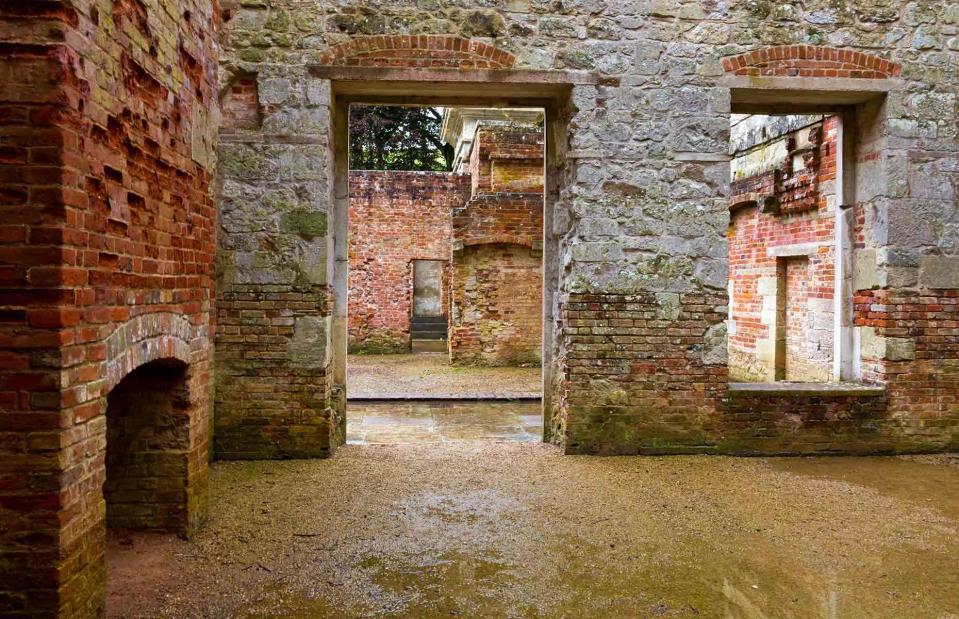
NorthScape / Alamy Stock Photo
Appuldurcombe House reinvented itself numerous times after the sale – it became a hotel, a college for young gentlemen and a monastery for Benedictine monks. Sadly, it was left empty from 1909, aside from serving as temporary accommodation for troops in the First and Second World Wars.
The wartime years weren't kind to the mansion and it was reduced to a shadow of its former self following a catastrophic bombing in 1943. Demolition was proposed but the house was thankfully saved from the wrecking ball and has been under the guardianship of the UK Secretary of State since 1953.
Appuldurcombe House, Isle of Wight, UK
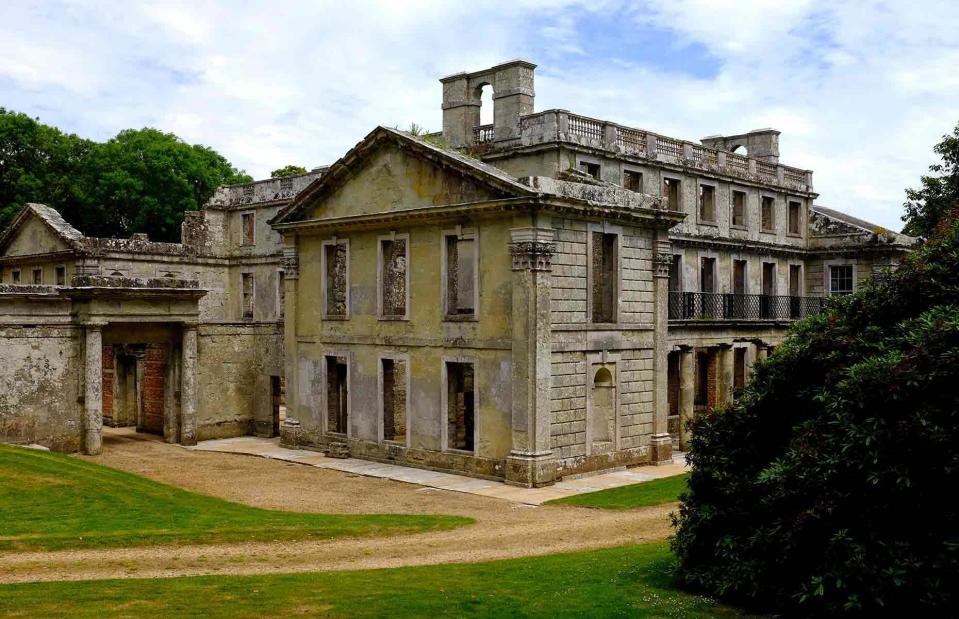
Sean Philip Potter / Alamy Stock Photo
As the state of the structure deteriorated, its interior fixtures and fittings were stripped out for preservation. While the mansion is a ruin, its grand frontage has been sensitively restored and some areas of its interior architecture are starting to be reinstated.
Despite its crumbling state, its past is still palpable and the abandoned shell stands as a monument to more than 300 years of history. Open to the public, visitors can now admire the bones of this faded treasure.
Tannenfeld Castle, Thuringia, Germany
![<p>Mike Bonitz / Flickr [CC BY-ND 2.0 DEED]</p>](https://s.yimg.com/ny/api/res/1.2/x9iBPYn4yIxYMii1n6Jzpg--/YXBwaWQ9aGlnaGxhbmRlcjt3PTk2MDtoPTYxOQ--/https://media.zenfs.com/en/loveproperty_uk_165/a395cf8694085b892b8926003b978dc4)
Mike Bonitz / Flickr [CC BY-ND 2.0 DEED]
Built at the turn of the 19th century, this incredible Baroque manor house is situated near the German town of Löbichau, just south of Leipzig. Back in its glittering heyday, it was the home of Duchess Anna Dorothea of Courland, a socialite, diplomat and patron of the arts who reportedly moved in the same circles as Napoleon and King Frederick William III of Prussia.
The Duchess is said to have hosted everything from festivals and concerts to political gatherings at Tannenfeld. It's not hard to imagine the grounds bustling with the movers and shakers of the day.
Tannenfeld Castle, Thuringia, Germany
![<p>Steffen Löwe / Wikimedia Commons [CC BY-SA 4.0]</p>](https://s.yimg.com/ny/api/res/1.2/pCspofaq.pLjwX62X5xtVA--/YXBwaWQ9aGlnaGxhbmRlcjt3PTk2MDtoPTYxOQ--/https://media.zenfs.com/en/loveproperty_uk_165/b7de378ab33181fd593b2ef18455e90d)
Steffen Löwe / Wikimedia Commons [CC BY-SA 4.0]
In keeping with the mansion's grand scale, the Duchess transformed the land around the house into a tranquil park brimming with flowers and immaculate landscaping. Guests including Tsar Alexander I of Russia are said to have visited the estate and marvelled at its beauty.
When the Duchess passed away, the sprawling estate was repurposed as a private sanitorium for people with mental health problems. Over the years it continued to serve as a hospital and then a care home, before it was abandoned.
Tannenfeld Castle, Thuringia, Germany
![<p>M. Delnoij / Wikimedia Commons [CC BY-SA 4.0]</p>](https://s.yimg.com/ny/api/res/1.2/oh88.8H5bB2AY5BMaDlX5w--/YXBwaWQ9aGlnaGxhbmRlcjt3PTk2MDtoPTYxOQ--/https://media.zenfs.com/en/loveproperty_uk_165/483dbc54c0d53a3853be4c16e39d51c6)
M. Delnoij / Wikimedia Commons [CC BY-SA 4.0]
While it's no doubt diminished from its 19th-century grandeur, Tannenfeld has weathered the years of neglect remarkably well. Panelled walls, parquet floors and a black marble hearth have seemingly survived the building's many iterations.
Featuring what appears to be a curtained stage, this elegant space may well have once hosted the theatrical and musical performances that the Duchess was renowned for putting on.
Tannenfeld Castle, Thuringia, Germany
![<p>Peatsmoke / Wikimedia Commons [CC BY-SA 4.0]</p>](https://s.yimg.com/ny/api/res/1.2/goQo7rlt6M5361vQOvvIwA--/YXBwaWQ9aGlnaGxhbmRlcjt3PTk2MDtoPTYxOQ--/https://media.zenfs.com/en/loveproperty_uk_165/cece00320d1c5cce3ebffaa93b65e4c9)
Peatsmoke / Wikimedia Commons [CC BY-SA 4.0]
Other rooms are from later chapters in the mansion's life, such as this krankenbett – or sick room – that would've been used by patients when the building was a hospital.
2017 signalled a fresh start for Tannenfeld when it was bought up by a group of private investors for just €280,000 (£238k/$305k). Continuing its caregiving legacy, they reportedly plan to transform the house into a healthcare facility for those suffering from dementia and mental illnesses. The group has committed to spending some €10 million (£8.5m/$10.9m) to renovate Tannenfeld Castle.
While there are no signs of progress yet, hopefully the estate's days of abandonment are behind it.
Dunnington Mansion, Virginia, USA
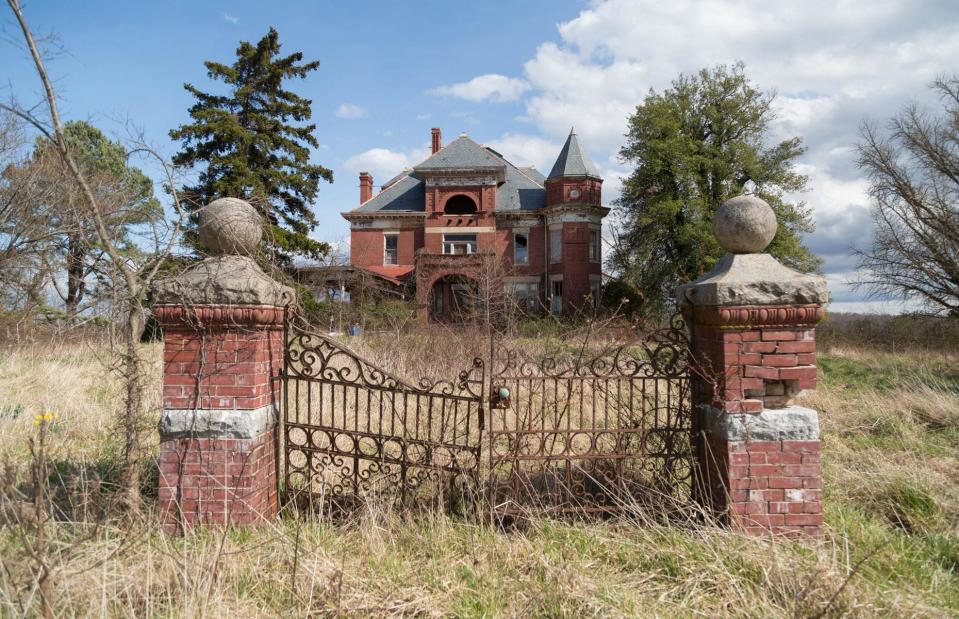
Bryan Sansivero
Documented by urbex photographer Bryan Sansivero, Dunnington Mansion sits alone in the middle of a golf course near Farmville, Virginia. Situated on a plot of unkempt land within the swish Manor Resort Golf Club, the mysterious mansion's exterior isn't in bad shape with its turret and brickwork more or less intact.
Dunnington Mansion, Virginia, USA
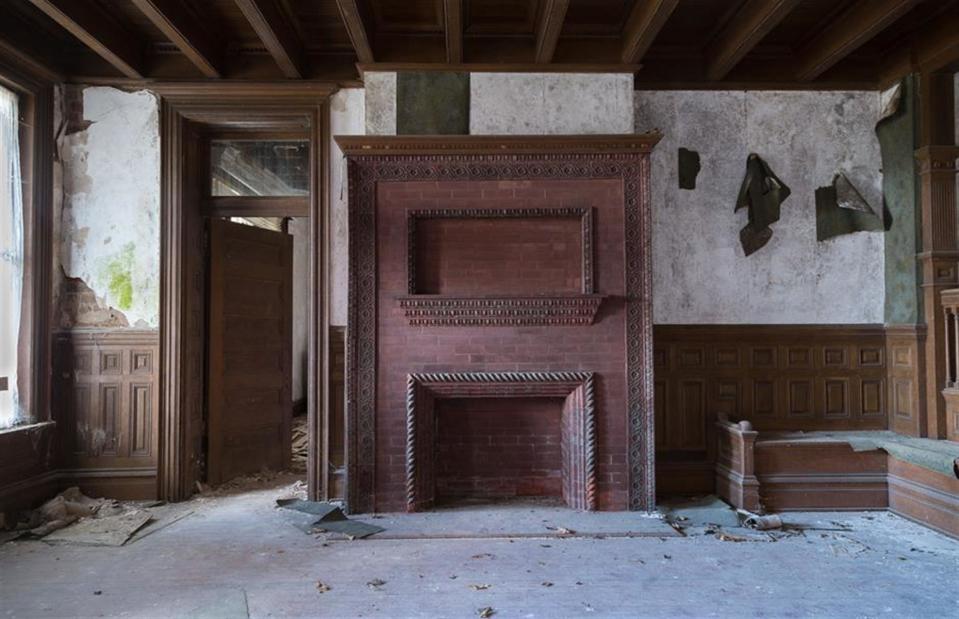
Bryan Sansivero
The abandoned mansion's history began in the 1700s when landowner Richard Woodson built a modest four-bedroom house on the land. He then passed the estate to his daughter Agnes, who built a brick house there in the late 18th century.
Following her death in the 1820s, the property passed to her daughter Frances and her husband James Wood. The duo expanded the property and kept it in the family until 1860 when it was snapped up by tobacco tycoon Walter Grey Dunnington, who transformed the building into the mansion we see today.
Dunnington Mansion, Virginia, USA

Bryan Sansivero
Once the scene of grand society gatherings, today the home has been left to ruin. Following the death of India Dunnington, the wife of Walter Dunnington, in 1960, it's uncertain who inherited the home.
In 1999 it was sold to the Community Development Authority, who had big plans to turn it into a hotel and spa. However, the funding dried up and the house was left to languish.
Dunnington Mansion, Virginia, USA
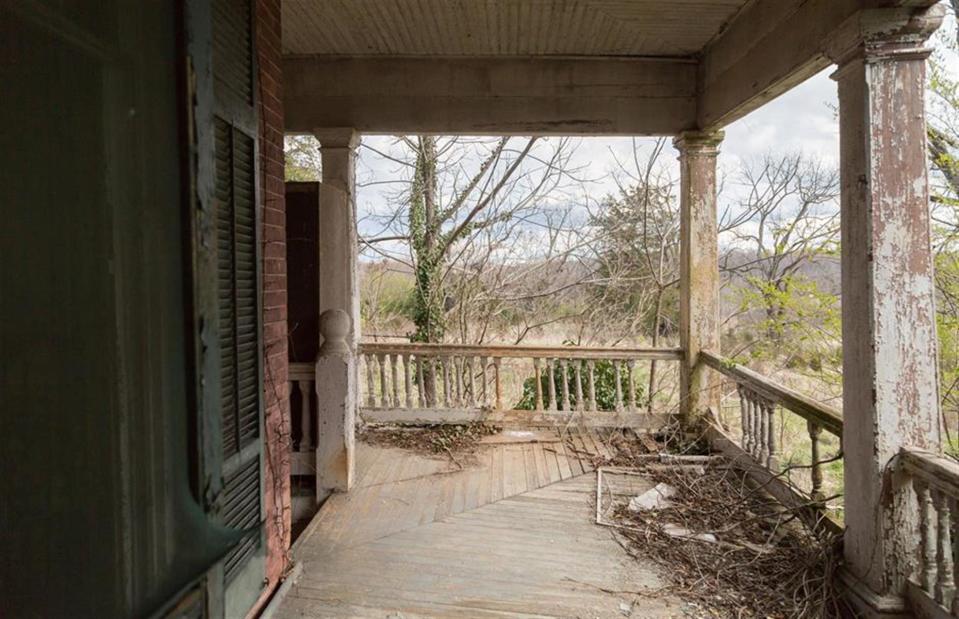
Bryan Sansivero
However, hope may be on the horizon. The house, along with 766 acres of the golf club's surrounding land, is now up for grabs via Sotheby's International Realty for $10.9 million (£8.5m).
In an interview with The Farmville Herald, the Dunnington Mansion Foundation, a nonprofit dedicated to protecting the house and its history, said it was "cautiously optimistic" about the possible sale. Here's hoping this architectural gem will be brought back from the brink!
Rockwell House, Georgia, USA
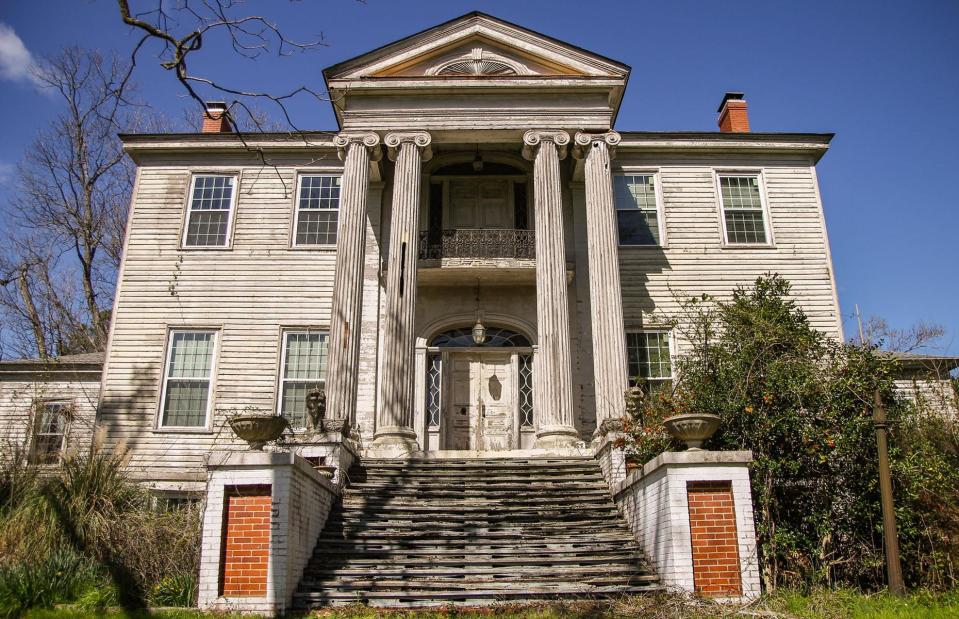
Abandoned Southeast
Captured by Leland Kent of Abandoned Southeast, this grand 19th-century house was abandoned following a fire in 1969.
Nestled in Milledgeville, Georgia, the rundown southern belle still had plenty of kerb appeal when it was photographed back in 2017, from the double-height columned pediment to the impressive stone steps that lead up to the entrance.
Rockwell House, Georgia, USA
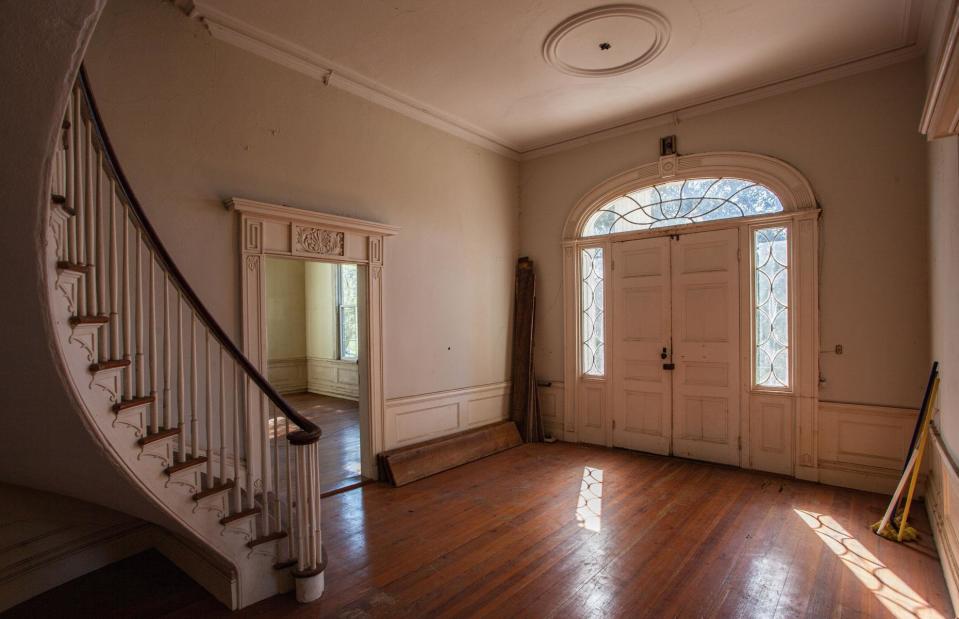
Abandoned Southeast
Built for Colonel Samuel Rockwell, no expense was spared in its design, which comprises hundreds of pieces of hand-cut timber.
Over the years, the property changed hands numerous times and was even used as a summer retreat by Georgia Governor Herschel Vespasian Johnson in the 1850s – we can just imagine this grand entrance hall welcoming Milledgeville's upper echelons to the property's many soirées.
Rockwell House, Georgia, USA
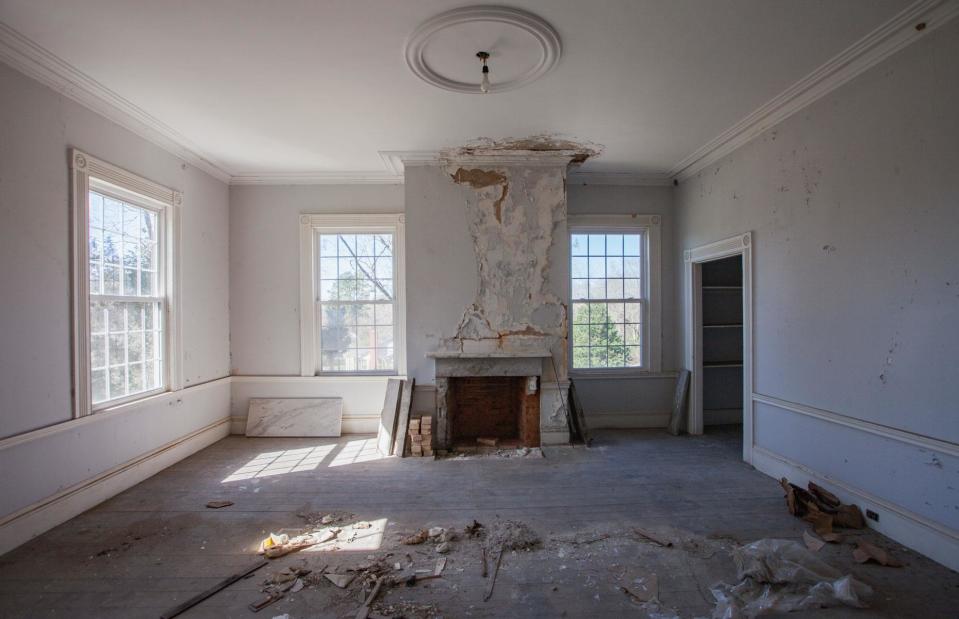
Abandoned Southeast
While signs of wear and tear were evident by the mid-1900s, the estate stood relatively unscathed until one fateful day in August 1969. Workmen were busy removing paint from the walls of one of the upstairs rooms with a blow torch when the wooden structure unsurprisingly caught light. Though the damage was made good, the room was exposed to the elements and left to languish, along with the rest of the structure.
Rockwell House, Georgia, USA
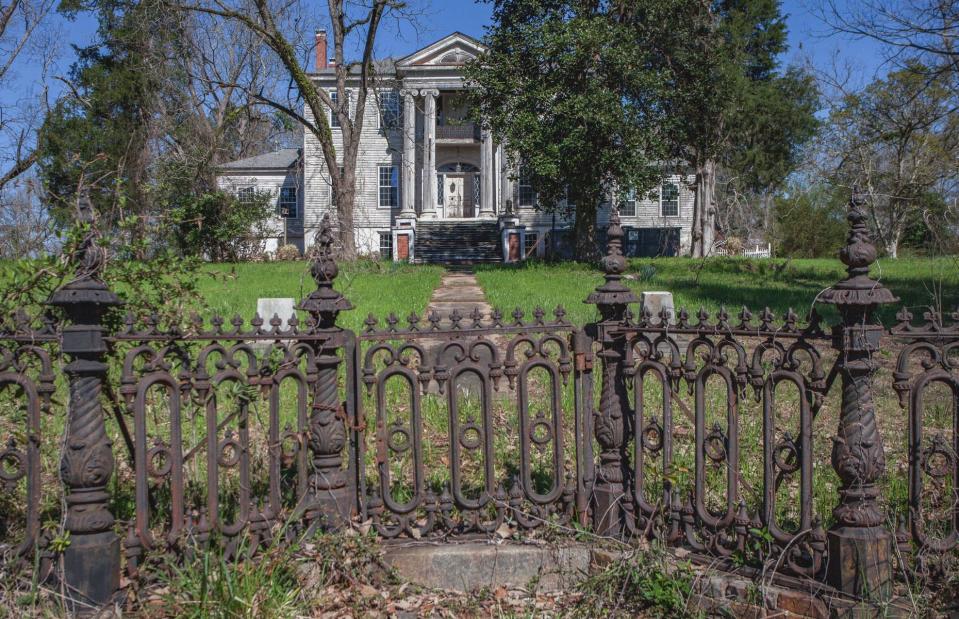
Abandoned Southeast
Thankfully, a group of plucky investors sensitively restored the house in 2021, returning the local landmark to its former glory and opening it up to the public for events and short-term lets.
While the structure was in need of serious attention, many of the home's original features were preserved, including the spectacular wrought-iron fence that encircles the property. Back when Rockwell commissioned the design, it was said to have cost the same amount as the house.
The mansion has since sold again in early 2024, however, the new owners appear to be equally committed to preserving the home's legacy and continuing its successful run as a holiday rental and wedding venue.
Abandoned billionaire's mansion, Japan
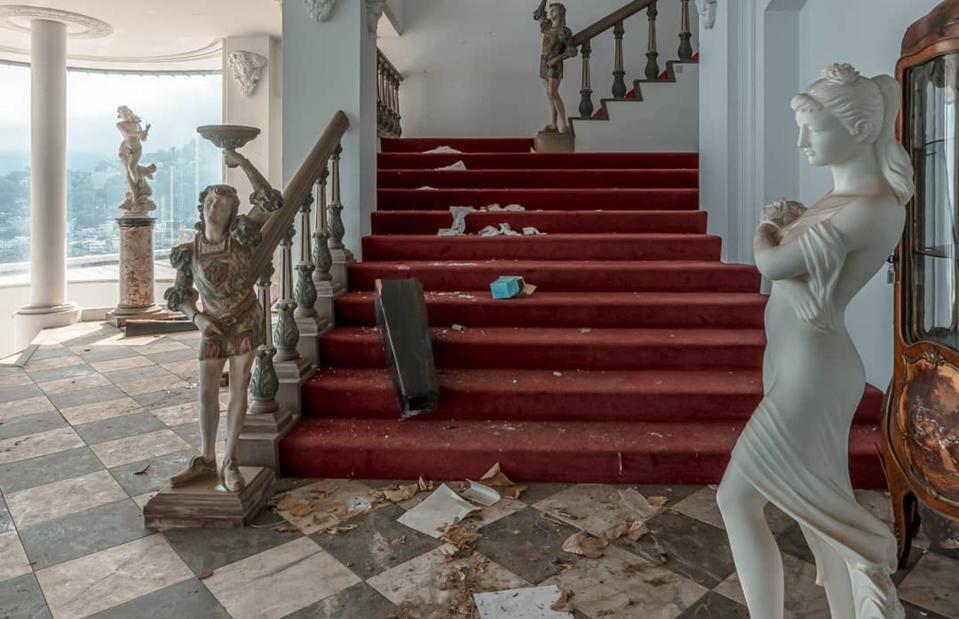
Steve Ronin / YouTube
This abandoned billionaire's mansion was once the home of businessman Genshiro Kawamoto. Following his arrest for tax evasion in 2013, the decadent dwelling was deserted and after years of neglect, time has taken its toll on the glitzy interior. Kawamoto was later sentenced to four years behind bars in 2018.
Filmed by urban explorer Steve Ronin, the ornate staircase, once lined with luxurious red carpet, is now littered with debris and discarded rubbish.
Abandoned billionaire's mansion, Japan

Steve Ronin / YouTube
Among the discoveries made by Ronin was Kawamoto's extensive art collection. Marble and stone statues adorn the dusty living areas, while an array of extravagant gold chandeliers hang redundantly overhead.
Once home to elaborate dinner parties, the luxurious dining space now lies lifeless.
Abandoned billionaire's mansion, Japan
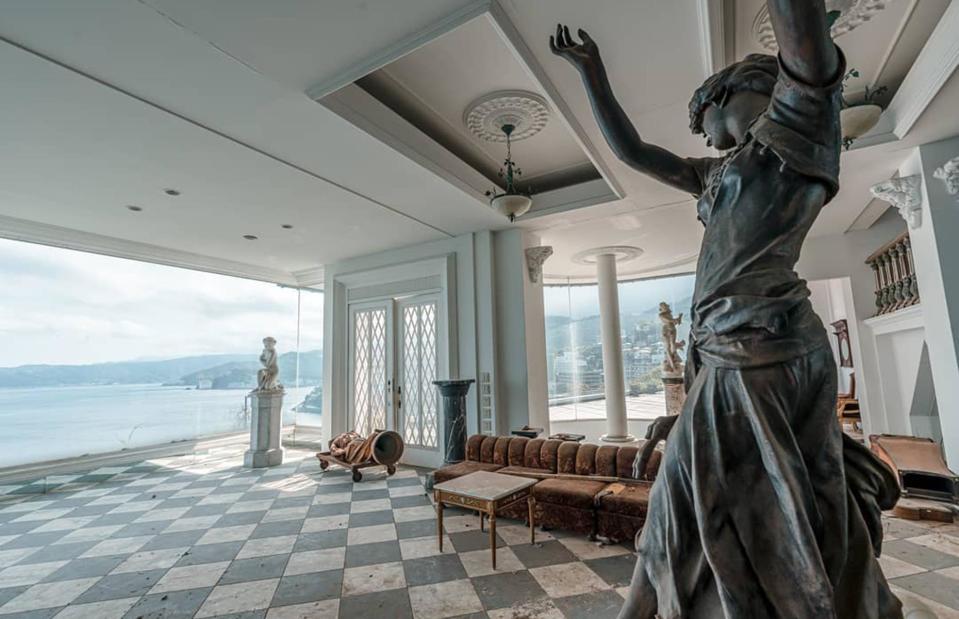
Steve Ronin / YouTube
One thing that hasn't weathered with time is the view. Perched on a bluff overlooking the water, swathes of windows frame stunning panoramas of the coast below.
Inside, a tattered sofa and worn coffee table offer sparse decoration, along with a few eerie statues dotted around the dirty checkerboard floor.
Abandoned billionaire's mansion, Japan
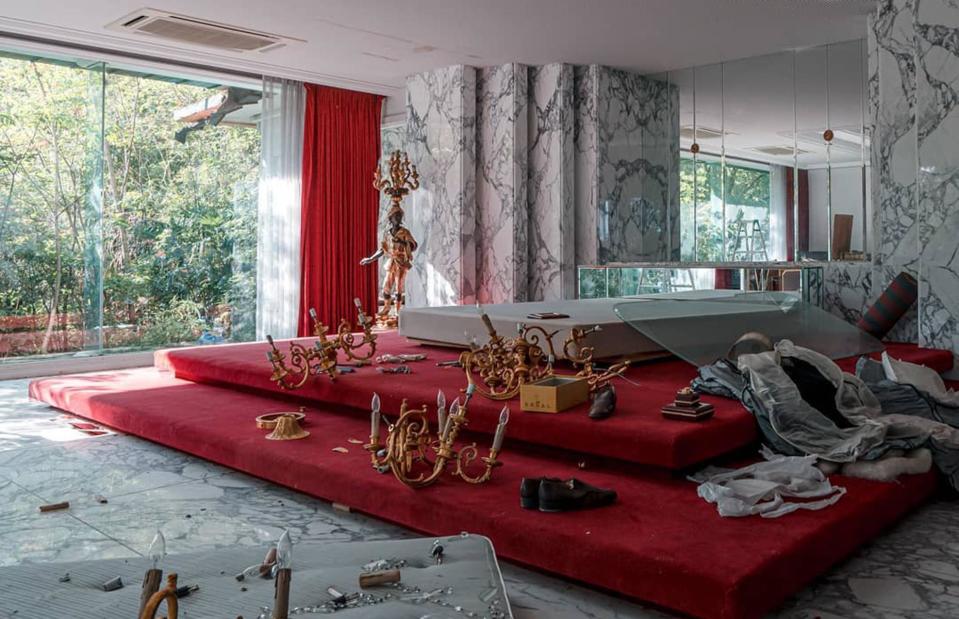
Steve Ronin / YouTube
Once the mansion's most luxurious room, the bedroom is awash with faded grandeur, from the marble-clad walls to the bare mattress elevated on a red-carpeted platform. Chandeliers lie discarded on the steps, along with shoes and piles of clothing. We wonder what the future holds for this sorry space.
Outlaw House, Alabama, USA

Abandoned Southeast
If you're a fan of Ian Fleming and John le Carré, this next derelict diamond is sure to pique your interest. Another find by Leland Kent of Abandoned Southeast, the hacienda-style home, known as the Outlaw House, was a treasure trove of clandestine secrets.
Once located in rural Alabama, the property was formerly owned by the enigmatic G. C. Outlaw, identified in 1918 archive records as an FBI agent – documents show that he even investigated threats made by the infamous Ku Klux Klan.
Outlaw House, Alabama, USA
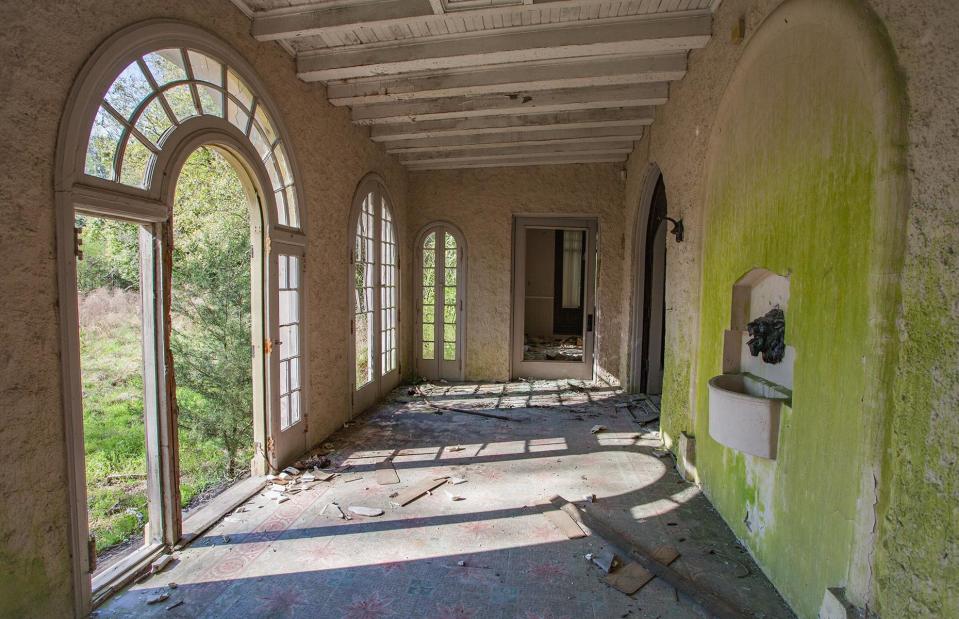
Abandoned Southeast
Outlaw, who went on to found a cafeteria empire after leaving the bureau, is rumoured to have acquired the house in a poker game. Offering a tranquil escape from nearby Mobile, it stayed in the Outlaw family until it was deserted in 1985, when G. C.'s son, Arthur, left for the city.
Captured here in 2019, the house had long fallen into despair, the dazzling arched windows were exposed to the elements and wooden boards and plaster littered the floor.
Outlaw House, Alabama, USA
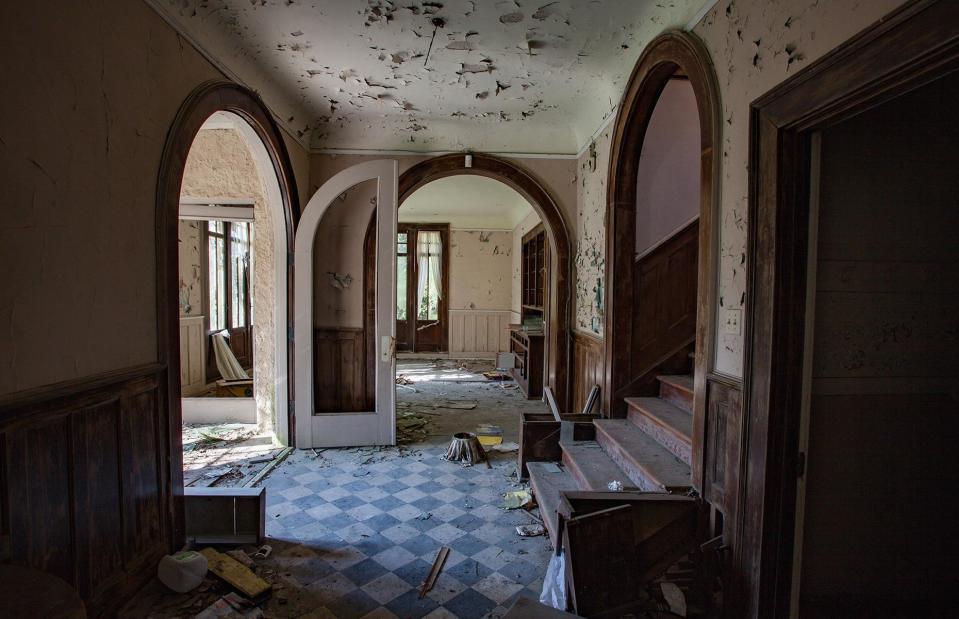
Abandoned Southeast
Back in its heyday, the home was considered especially innovative, being the first in the area to have electricity and a telephone, powered by the nearby dam.
Despite the peeling ceiling and scattered debris, the property would have looked magnificent had it been restored to its former grandeur, with that stunning checkerboard floor shining once more and the handsome wood panelling revived.
Outlaw House, Alabama, USA
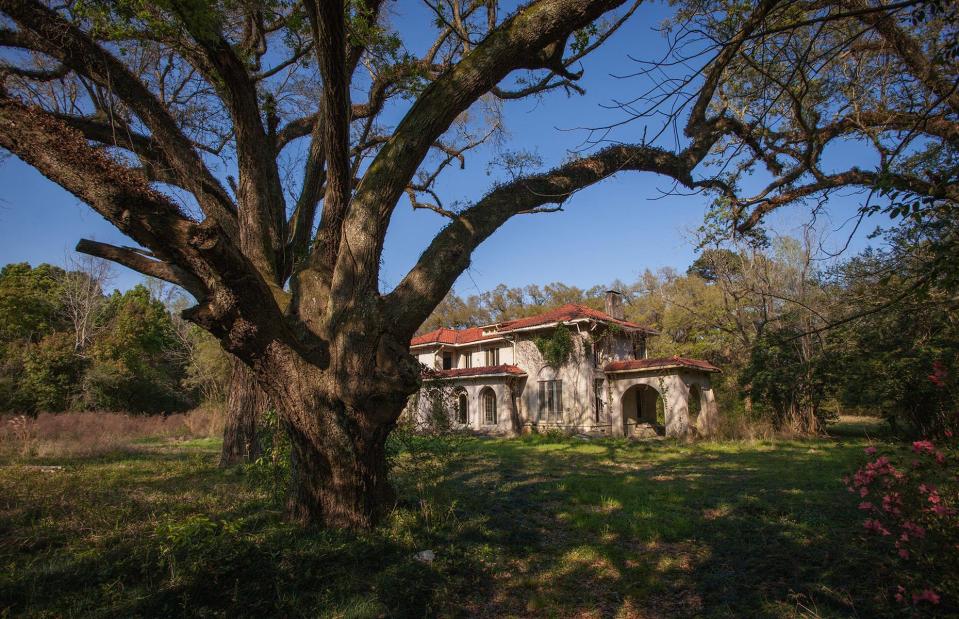
Abandoned Southeast
While the striking property sadly languished, rumours still swirl about the mysterious G. C. Outlaw – according to one local legend, there was once said to be a secret underground tunnel connecting the house with the dwelling across the road.
Many had hoped the historic house would be saved, but tragically a fire ripped through the property in July 2021. The blaze destroyed the second floor and devastated the rest of the house. The cause of the fire is still unknown. In December of the same year, what remained of the property was sadly razed to the ground.
Billionaires' Row mansion, London, UK
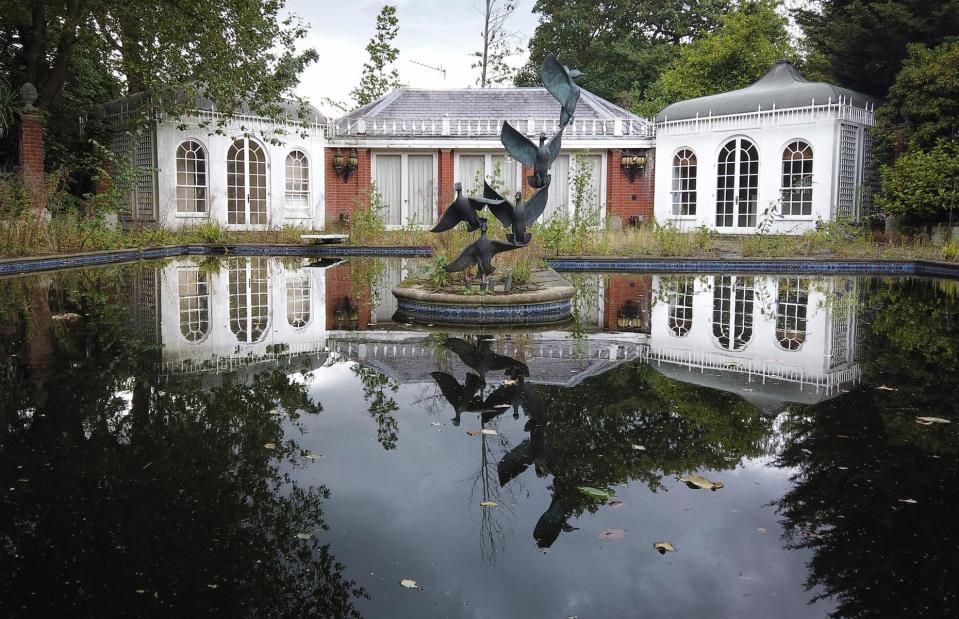
Beyond The Point
Located in north London, affluent Bishops Avenue is home to some of the priciest rows of property in the capital, however, much of the real estate here lies eerily deserted.
Captured by urban explorers Beyond The Point, this forlorn mansion is void of life, encircled by overgrown grass and insidious weeds.
Billionaires' Row mansion, London, UK
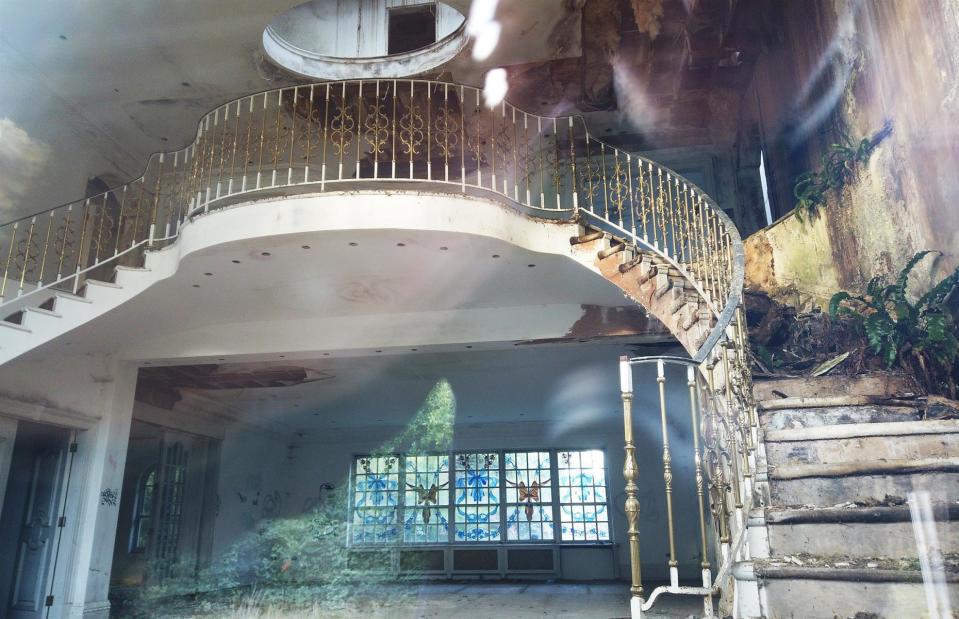
Beyond The Point
Left to languish, many of the homes on Billionaires' Row are reportedly owned by foreign investors who leave the properties uninhabited, while around 20 of the mansions are visibly derelict.
Once a grand vestibule with a sweeping double staircase, neglect has reduced this hallway to damp-ridden walls and crumbling ceilings, leaving the interior exposed to the elements.
Billionaires' Row mansion, London, UK
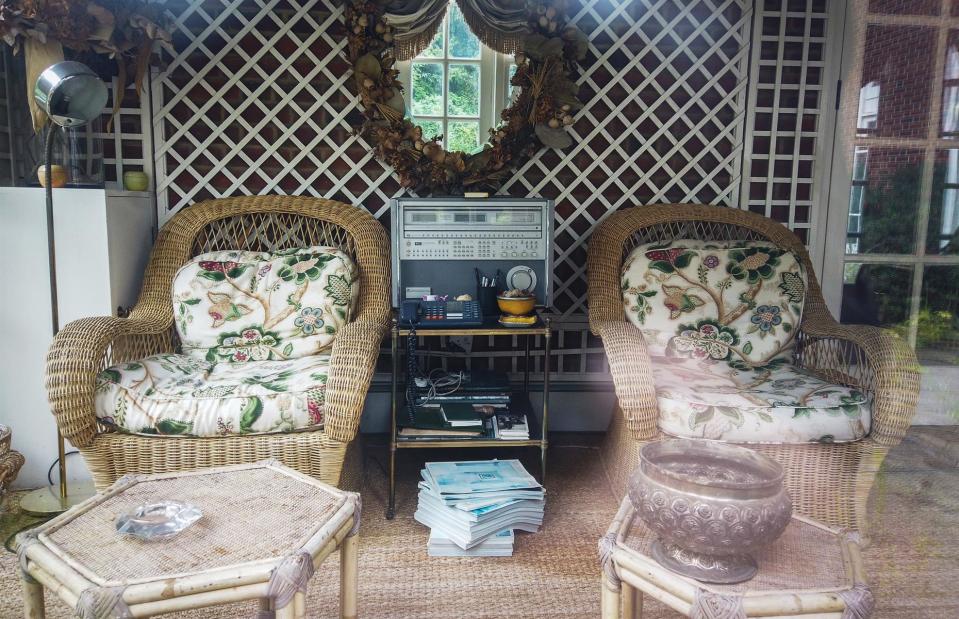
Beyond The Point
Not all of the spaces are rundown however, with many of the abandoned interiors miraculously frozen in time.
This dated conservatory is a veritable time warp, with the old-fashioned hi-fi and boxy cord telephone on the console table offering a nostalgic reminder of yesteryear. Between the two armchairs, a stack of well-thumbed magazines sits discarded on the floor, anticipating the homeowners' return.
Billionaires' Row mansion, London, UK
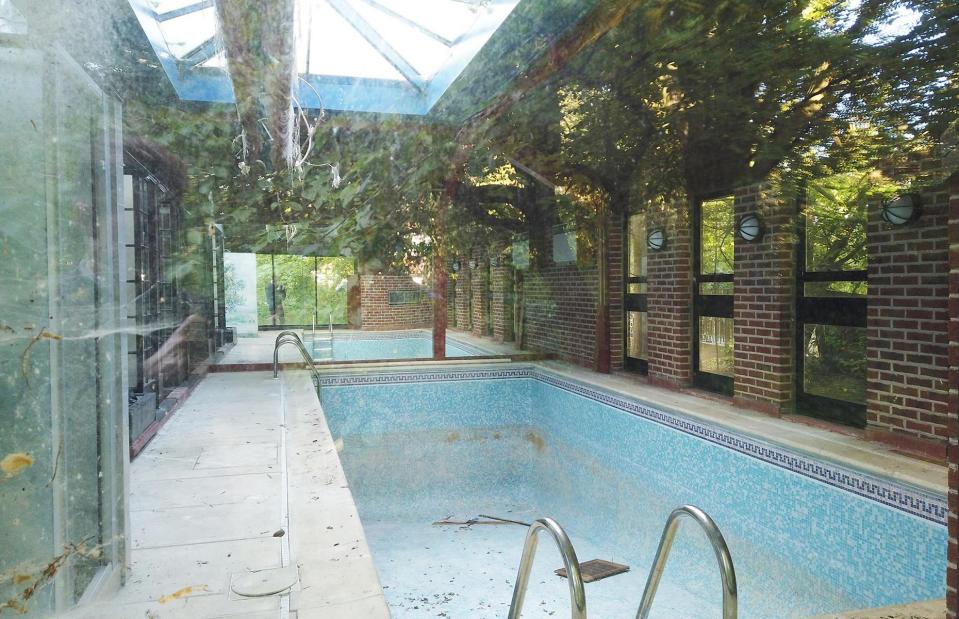
Beyond The Point
Inside the pool house, wires dangle precariously from the ceiling and debris and grime line the floor of the empty swimming pool. From London's plushest postcode to an abandoned street of decaying decadence, Billionaires' Row is now a far cry from its glamorous glory days.
Tiki-inspired party house, Tennessee, USA
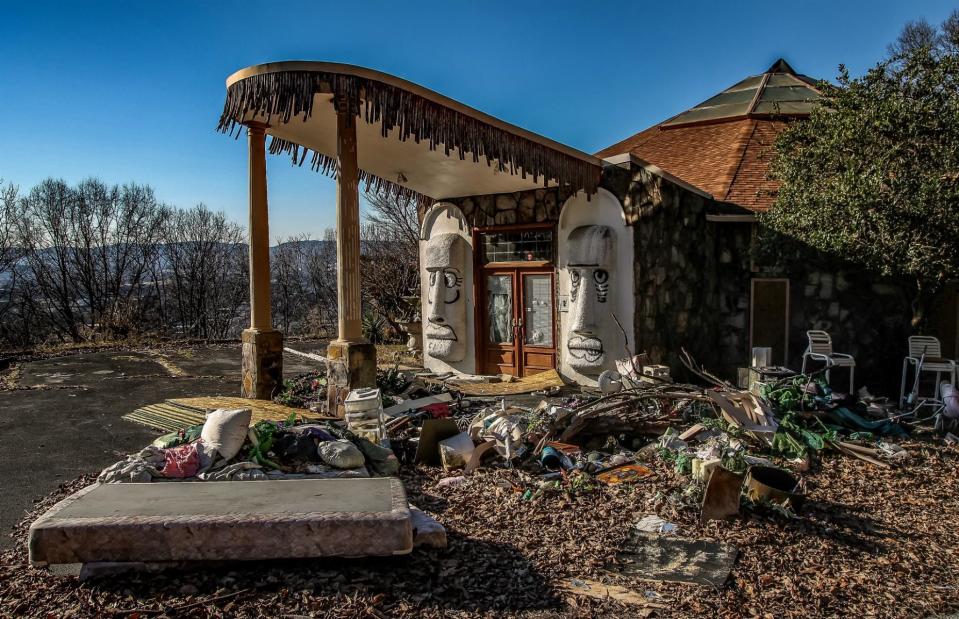
Abandoned Southeast
With an entrance flanked by vast stone tikis, this extravagant Polynesian-inspired home, photographed by Leland Kent in 2017, made quite the first impression.
Perched on a hill in Chattanooga, Tennessee, the opulent house was built in 1972, however, it saw a drastic change in its fortunes in more recent years. Filled with debris and discarded furniture, this abandoned mansion was a shadow of its former grandeur.
Tiki-inspired party house, Tennessee, USA
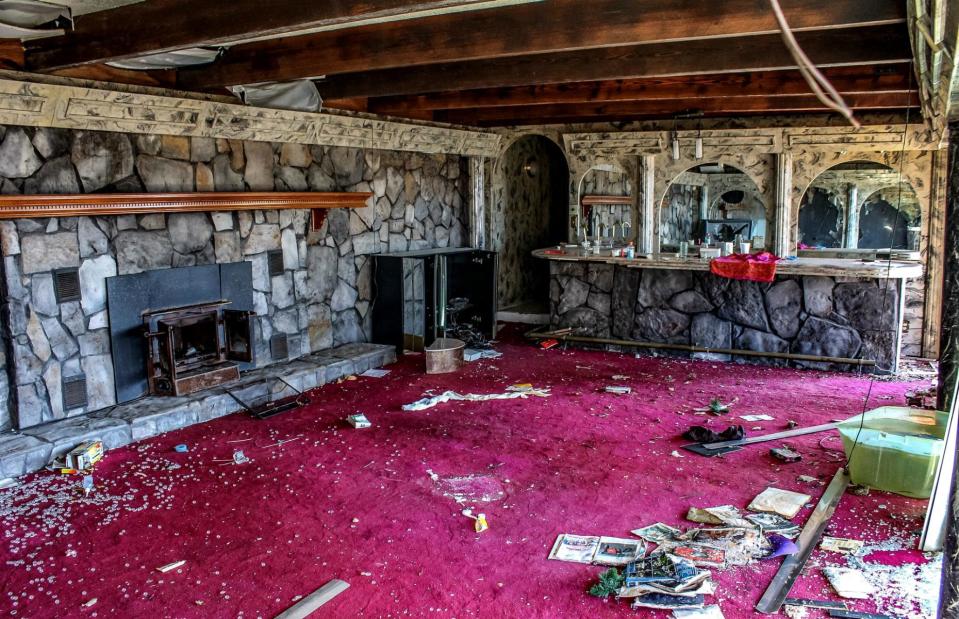
Abandoned Southeast
Designed with entertaining in mind, the extravagant house, which encompassed three bedrooms and four bathrooms, was the brainchild of club owner and entrepreneur Billy Hull.
Inside, one of the living spaces featured a marble-topped bar and faux stone cladding that had seen better days, while the worn red carpet was littered with broken glass and discarded mementos.
Tiki-inspired party house, Tennessee, USA

Abandoned Southeast
However, the 5,600-square-foot property's pièce de résistance had to be the vast vaulted pool room at the heart of the house. While it was left to ruin, the double-height space was still showstopping – we can just imagine crowds of well-dressed guests milling around the poolside.
The large swimming pool was still intact when Kent visited the property, but it had become a dumping ground for broken furniture and a playground for vandals.
Tiki-inspired party house, Tennessee, USA
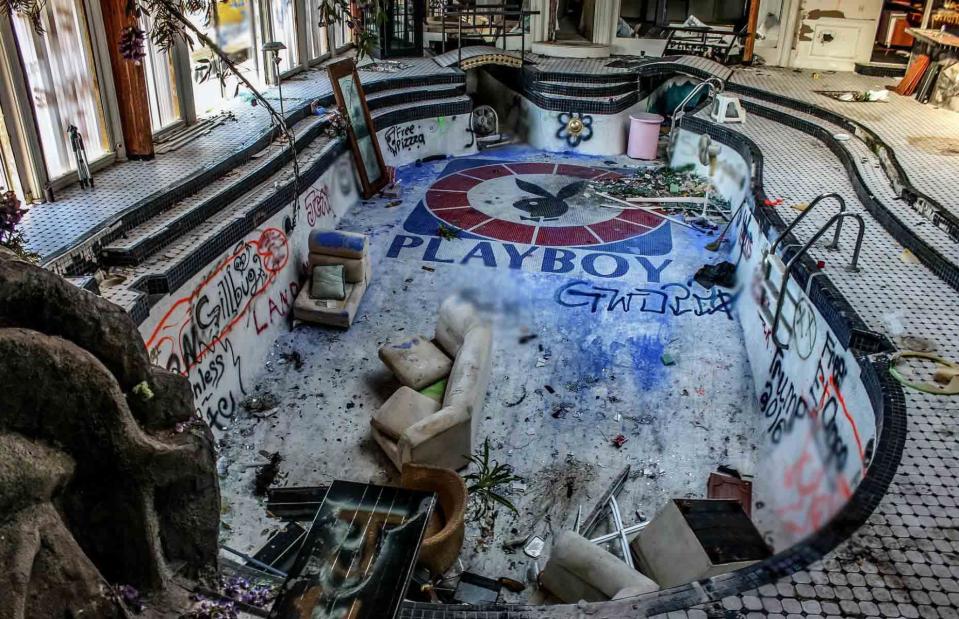
Abandoned Southeast
Behind the glitz and glamour of the home's heyday lies a darker tale. The unusual property was abandoned only a year after it was completed, following Hull's conviction as an accessory to murder. The home subsequently fell into disrepair, before it was seized by the city in 2017 and reduced to rubble.
Arlington, Mississippi, USA

Abandoned Southeast
Encompassing a vast 55 acres of land, the historic estate of Arlington in Natchez, Mississippi is thought to have been constructed in the early 19th century. The Federal-style property, captured here by Leland Kent, was listed in the National Register of Historic Places in 1973 and declared a National Historic Landmark the following year.
Arlington, Mississippi, USA
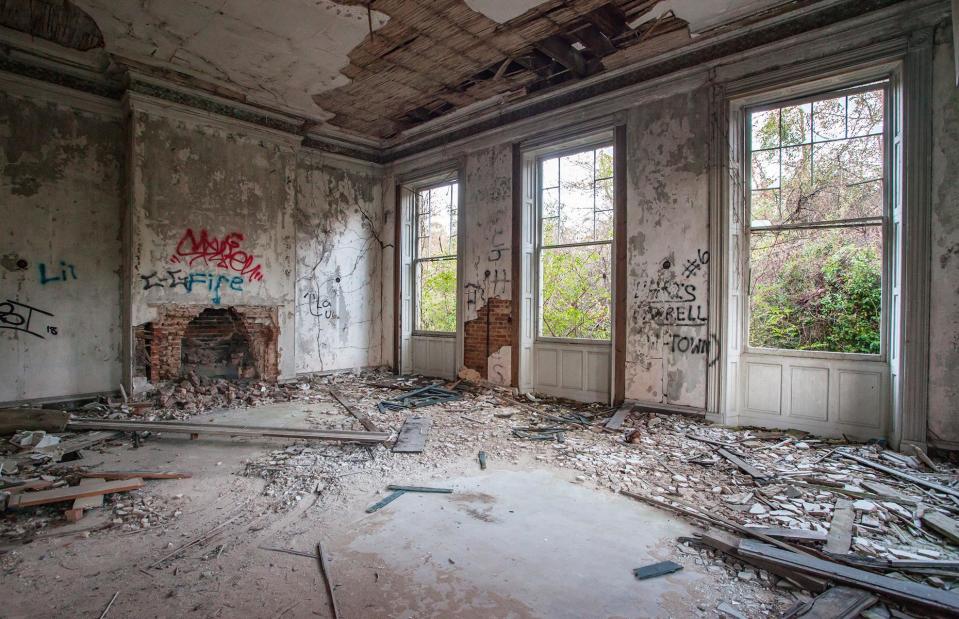
Abandoned Southeast
It's thought that the palatial property was built by John Hampton White for his wife, Janet Surget White. Janet was the daughter of Pierre Surget, a French immigrant and head of one of Natchez's most prominent families.
While the mansion is now a derelict shell, its hallowed halls were once the scene of many a society soirée. With a little creative thinking, we can just imagine this grand space decked out in gilded finery as well-dressed guests circulate from room to room.
Arlington, Mississippi, USA

Abandoned Southeast
Tragedy befell the landmark building in 2002 when a fire ripped through the structure, destroying the roof and the second floor. Exposed to the elements and decimated by the blaze, the house was named the second-most endangered historic property in the state by the Mississippi Heritage Trust in 2009.
Arlington, Mississippi, USA
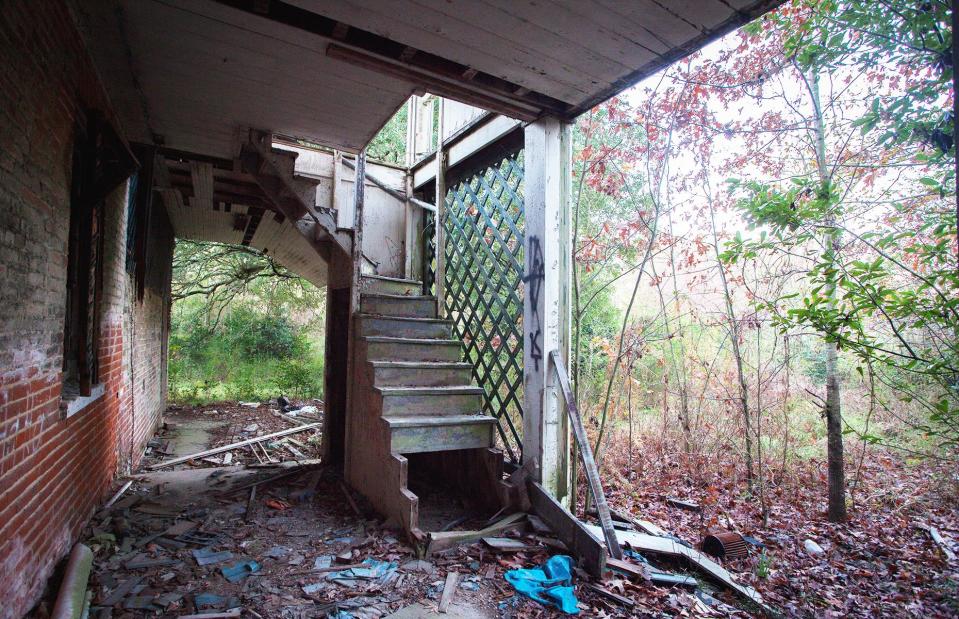
Abandoned Southeast
The rambling grounds are equally as rundown, with overgrown weeds surrounding the estate and debris from the building scattered across the acreage.
Following the fire, the Historic Natchez Foundation replaced the home's roof and worked alongside the National Park Service to salvage as many antique furnishings and fixtures as possible.
Meanwhile, in 2021, a Florida couple with a passion for historic homes launched a fundraising campaign to purchase and restore the home. It's not yet known if their efforts were successful...
Briarcliff Mansion, Georgia, USA
![<p>Keizers / Wikimedia Commons [CC BY-SA 3.0 DEED]</p>](https://s.yimg.com/ny/api/res/1.2/HbCJhC3O3jyhjrmhE33F7g--/YXBwaWQ9aGlnaGxhbmRlcjt3PTk2MDtoPTYxOQ--/https://media.zenfs.com/en/loveproperty_uk_165/f687788e6780604f505ba7bb9259e931)
Keizers / Wikimedia Commons [CC BY-SA 3.0 DEED]
Found in Atlanta, Georgia, this grand structure was once the home of Coca-Cola heir Asa Griggs Candler Jr., whose father patented the iconic brand in 1893. Candler Jr. and his siblings sold their shares in the company in 1919 and he went on to build regal Briarcliff Mansion in the 1920s.
Now boarded up and languishing, it's hard to envisage the opulent party pad that he created, which even reportedly held a zoo.
Briarcliff Mansion, Georgia, USA
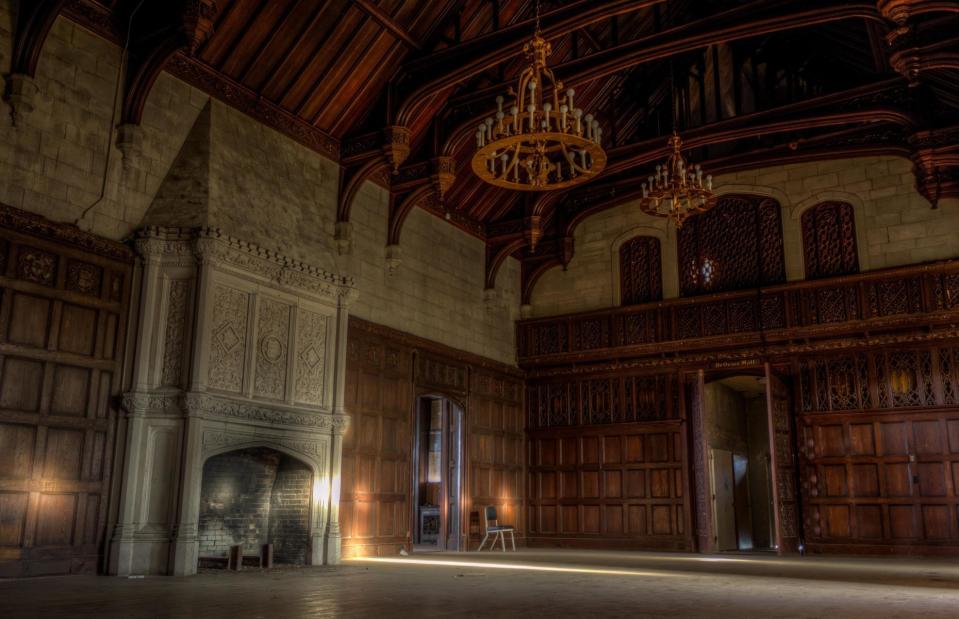
Media Drum World / Alamy Stock Photo
Candler Jr. is said to have made a number of extensions to the home over the years, adding a 1,700-square-foot music room complete with a cathedral-sized organ.
In its heyday, the mansion encompassed over 40 rooms, two pools and a ballroom – a far cry from the dusty, decrepit property that stands today.
Briarcliff Mansion, Georgia, USA
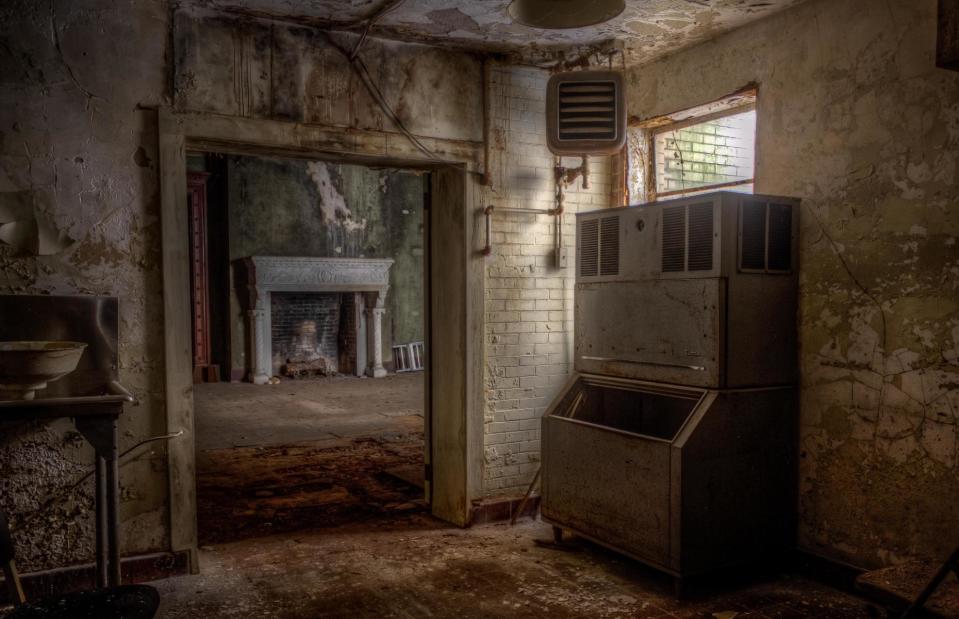
Media Drum World / Alamy Stock Photo
When Briarcliff sold in 1948, it became a treatment centre and mental health clinic, before Emory University snapped up the structure in 1998.
These days, the rooms have been stripped bare and the walls marked by the numerous trespassers who've passed through over the years.
Briarcliff Mansion, Georgia, USA
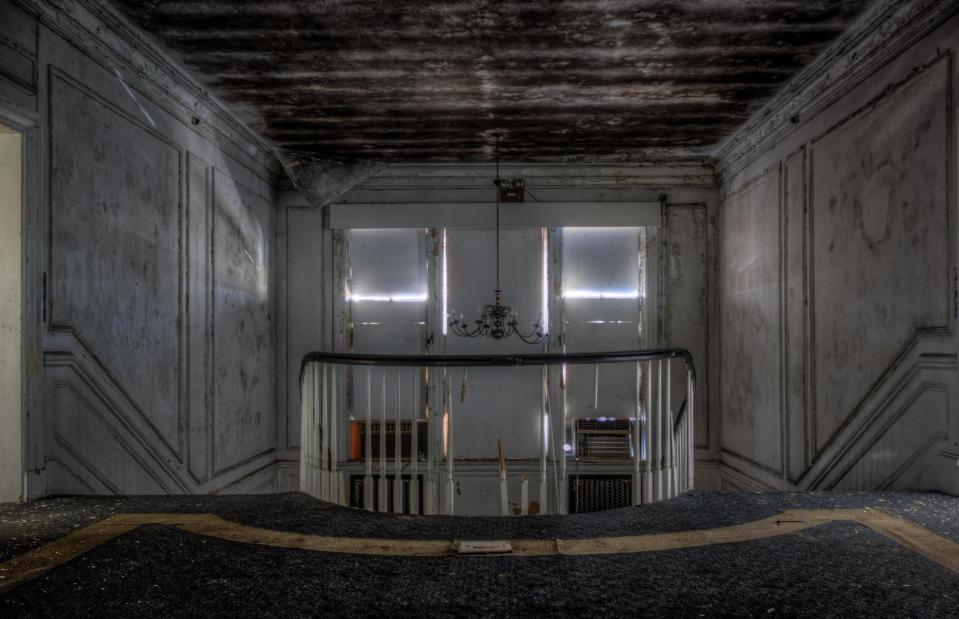
Media Drum World / Alamy Stock Photo
Plans to bring the abandoned mansion back to life were on the horizon for a time, with a developer intending to restore the home and transform it into a luxury hotel. Unfortunately, the project was deemed too costly and the venture was abandoned.
Change is afoot, however. Emory University has reportedly leased 32 acres of the Briarcliff Campus to Galerie Living, a developer specialising in senior living communities. While Briarcliff Mansion won't be used for housing, it will be restored as part of the company's agreement with the school. It seems things are looking up for this historic home!
Château Burrus, Alsace, France
![<p>Th. Franot / Wikimedia Commons [CC BY-SA 3.0]</p>](https://s.yimg.com/ny/api/res/1.2/JEyZe4EGeFXEMcr.W17LaQ--/YXBwaWQ9aGlnaGxhbmRlcjt3PTk2MDtoPTYxOQ--/https://media.zenfs.com/en/loveproperty_uk_165/f664520dd0761871c6aad89eca9ca0e2)
Th. Franot / Wikimedia Commons [CC BY-SA 3.0]
With its ornate stone pediments and wrought-iron balconies, this elegant château in the department of Haut-Rhin in eastern France is a spectacular sight. Despite the overgrown garden and shattered windows, Château Burrus, also known as Château Lumiere, is still undeniably enchanting, though its grand façade conceals a fascinating yet dark history.
Built for tobacco tycoon Jules Burrus in 1900, the house reportedly passed to his son, Marcel, who maintained ownership until the First World War.
Château Burrus, Alsace, France
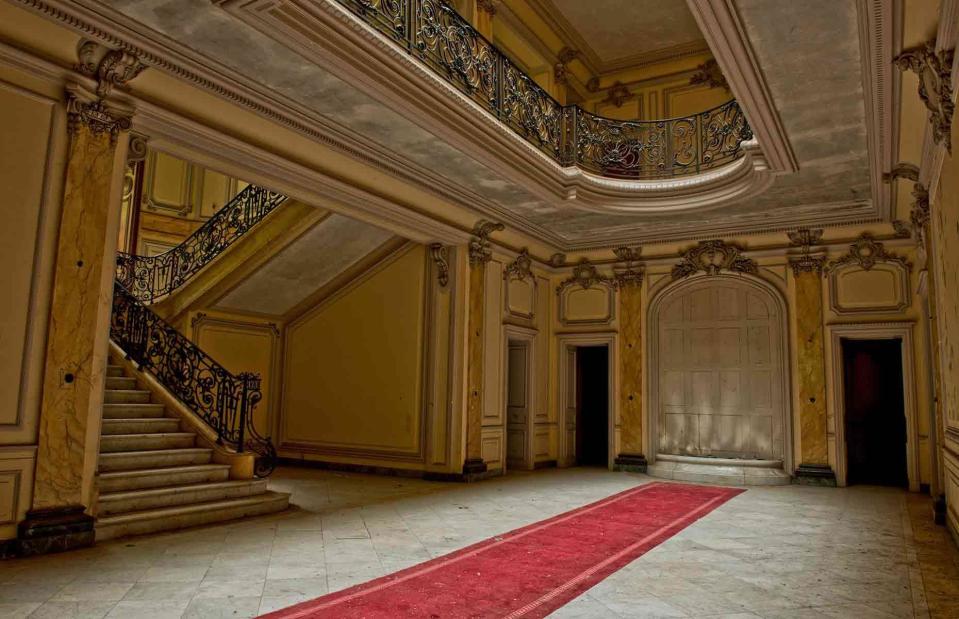
Simon Webster / Alamy
The magnificent château was then reportedly taken over by the German army in retaliation for Marcel Burrus's refusal to supply their troops with free cigarettes. Burrus consequently fled Alsace, returning to the family estate after the war, though the property was requisitioned once more in the Second World War when it became an SS training centre.
Upstairs, the gallery walkway is encircled by intricate wrought-iron balustrades framing the entrance vestibule, which still contains a long, faded red carpet to welcome guests.
Château Burrus, Alsace, France
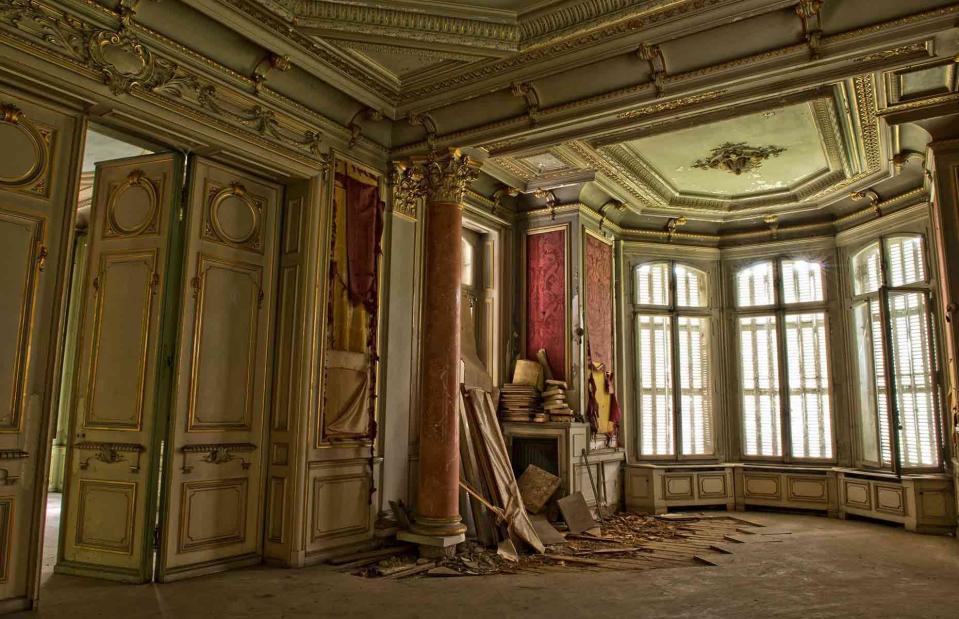
Simon Webster / Alamy
Few signs of the château's checkered past now remain. Flanked by red marble columns, this exquisite bay window is palatial, while the corniced ceiling is still remarkably intact.
While the space has suffered from neglect, the grand, ethereal room is just as imposing today as it was all those decades ago.
Château Burrus, Alsace, France
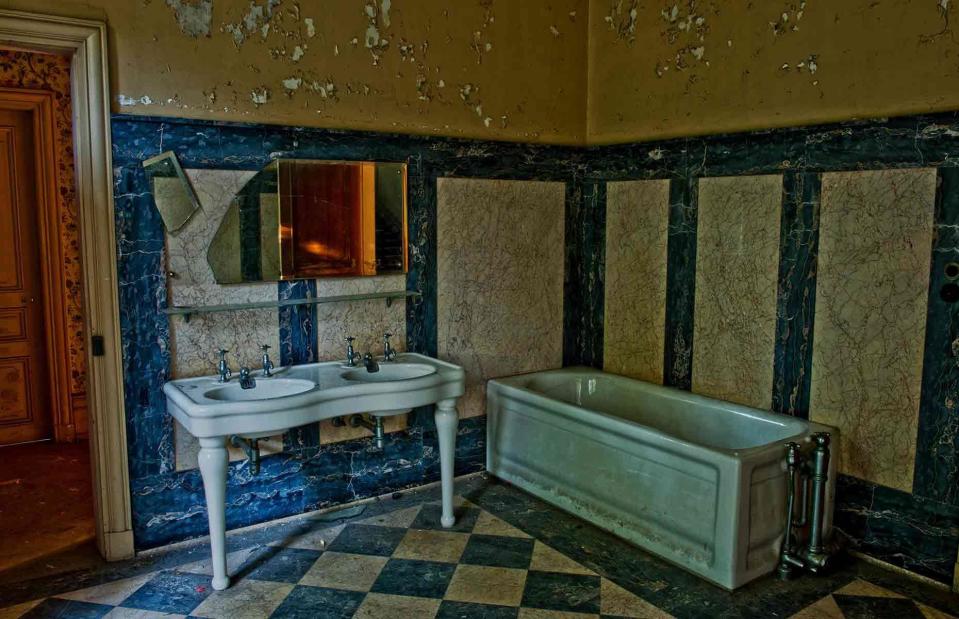
Simon Webster / Alamy
In the late 20th century, the château was snapped up by a religious order and then sold on and deserted in the early 1990s.
Throughout the forlorn house, a plethora of period features are crying out for restoration – just look at that stunning checkerboard floor and the Regency-style double sink.
Little is known about the fate of this architectural gem, though it would be a shame to see the exquisite estate crumble.
Howey Mansion, Florida, USA
![<p>Shanejayhayes / Wikimedia Commons [CC BY-SA 4.0 DEED]</p>](https://s.yimg.com/ny/api/res/1.2/SR1FCWgh4MZIWoWJKthPwQ--/YXBwaWQ9aGlnaGxhbmRlcjt3PTk2MDtoPTYxOQ--/https://media.zenfs.com/en/loveproperty_uk_165/dba3f7c84a139f5fde2a370c498cf4d5)
Shanejayhayes / Wikimedia Commons [CC BY-SA 4.0 DEED]
When it comes to first impressions, this enchanting estate scoops the top spot in our roundup. With its grand Mediterranean Revival architecture and rose stucco façade, there's more than an air of fairytale about Howey Mansion, even in the sorry state it's captured in here.
Located in the Florida community of Howey-in-the-Hills, the property was constructed in 1927 by William J. Howey, the founder of the surrounding town, as his main residence.
Howey Mansion, Florida, USA

Abandoned Florida
Photographed by Bullet of Abandoned Florida, the mansion's entrance is nothing short of magnificent. The front door is encircled by breathtaking stained glass, while the walls of the foyer are made from pre-cast plaster poured onsite by an Austrian artisan.
The creative mind behind the spectacular design was Katharine Cotheal Budd, a pioneering architect from New York City.
Howey Mansion, Florida, USA
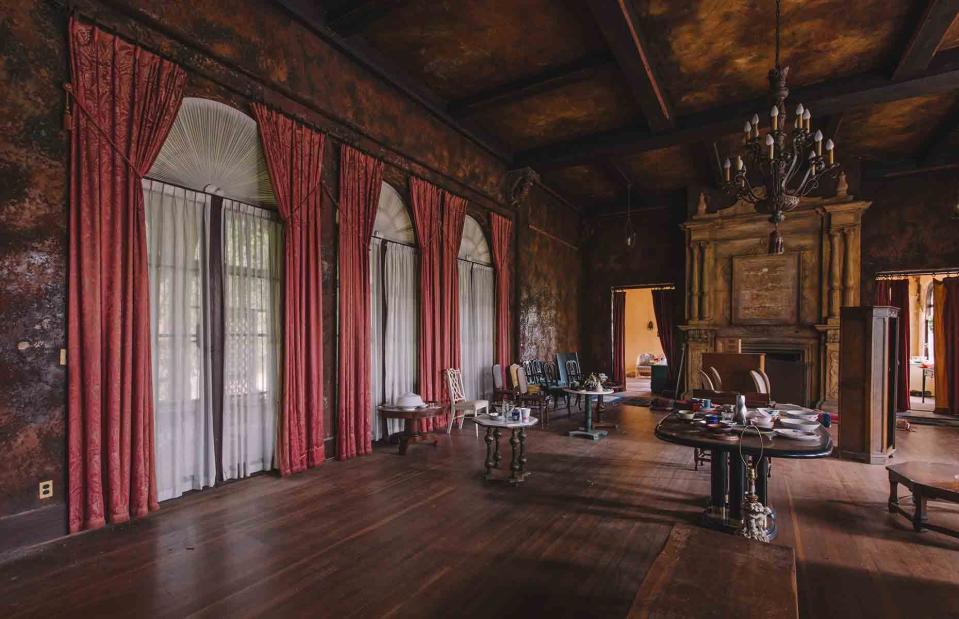
Abandoned Florida
Encompassing 7,200 square feet along with 15 acres of sprawling grounds, the property was certainly a showpiece for the Howeys.
The grand hall is perhaps one of the most imposing spaces, with its vast, double-height hearth, arched windows and beamed ceiling. From the towering red curtains to the mottled brown walls, it feels like a scene straight out of a Gothic novel.
Howey Mansion, Florida, USA

Abandoned Florida
In other rooms, the décor jumps forward in time – peach walls, pelmets, thick-pile carpet and a discarded rattan headboard transport us into the 1970s in this vacant pastel bedroom.
Until 2017, the mansion had stood abandoned for some time, but thankfully it's since been snapped up, restored and given a new lease of life as an enchanting wedding venue.
Now take a look at more incredible abandoned homes and buildings


